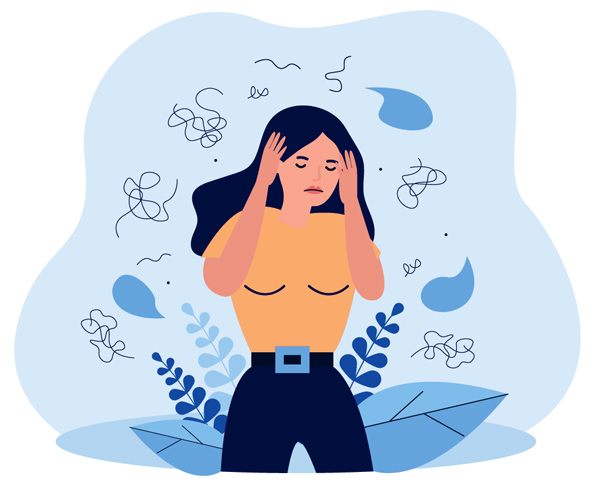Dealing with
Anxiety
Find the source. Learn to manage. Overcome
“I was always looking outside myself for strength and confidence, but it comes from within. It is there all the time.” – Anna Freud
What is Anxiety?
Occasional worrying or nervousness is generally normal and not a clinical issue. People worry about things like money, health, or family issues occasionally. An anxiety disorder, however, is a frequent state of worry that may interfere with your daily life. For many people with an anxiety disorder job performance, schoolwork and interpersonal relationships can be affected. Your anxiety may manifest in physical symptoms. These may include:
- Restlessness
- Agitation and irritability
- Mood swings
- Poor concentration
- Fatigue
- Muscular tension
- Panic attacks
- Changes in sleep habits (including insomnia or hypersomnia)
- Gastrointestinal (GI) issues
Anxiety disorders go beyond nervousness or excitement. While it is not bad to feel anxious in your daily life, acute and chronic anxiety disorders can take a toll on one’s health. Descriptions such as “coming out of my skin” and “walking on eggshells” speak of the burden of the tension and are part of our routine everyday expressions.

We understand that the mental energy spent on anxiety could eventually be freed and put to use in desirable areas, like improved relationships, better memory and concentration, improved job performance, and decreased levels of exhaustion. People come to our office to obtain relief and eventually master symptoms that are preventing them from living more happily. Our goal is not only to help you through your feelings of anxiety but also to give you the tools to handle your anxiety more effectively over time.
We aim to resolve symptoms and make an effort recognize and modify underlying factors for more permanent relief through psychotherapy and medications. Keep in mind that the situation is often not forever. Our treatments will conform to your evolving needs. We all change: anxiety can get better.
Treating Anxiety and its Symptoms
Treatment for a patient with anxiety can come in many forms. The type of anxiety disorder a patient is living with can also be a major factor in treatment. Overall, the first step is seeking help. With your psychiatrist, you will talk through your experiences and feelings. Overall, this can be a vital step in approaching care. From there, we can begin to explore options that may work for you.
Anxiety affects everyone differently, and physical symptoms can manifest differently for some individuals. Because of this, optimizing the treatment of this condition is carried out by collaborative effort. Psychiatric conditions such as depression and anxiety are expected to change over time. Our goal is to give you the tools to explore your condition and find ways to improve your symptoms. Not every one needs prescription medication nor need to be on it forever if prescribed.
Job performance can be affected by insomnia, inability to focus, mood swings and irritability. A goal in treatment, besides relieving symptoms, is to help preserve functioning.
Panic Attacks
Panic attacks are a symptom of certain anxiety disorders. They are characterized by sudden and intense episodes of feeling panicky, often accompanied by physical symptoms such as shortness of breath, chest pain, rapid heartbeats or fluttering heart palpitations. For many, panic attacks can interfere with leading fulfilling life. Even when an attack itself is not occurring, the fear of experiencing one can create significant obstacles. Working with a supportive psychiatrist through psychotherapy and medication if needed, an individual can learn effective management techniques and regain control of their symptoms.
When Should I Seek Help?
If anxiety affects your personal life, work, health or relationships a psychiatrist can help. Excessive worries, difficulty managing your anxiety or frequent panic attacks can be indications for treatment. Depression, which can coexist with anxiety also needs to be addressed during treatment. These conditions if untreated can take a toll on one’s health. Remember, effective care can make a lasting difference in your overall happiness and those around you.
Types of Anxiety Disorders
There are different types of anxiety disorders. These can be brought on by different factors or causes. Below, we will detail some of its more likely forms.

Generalized Anxiety Disorder (GAD)
GAD is characterized by persistent, excessive worry that affects her daily life. Individuals may feel anxious about a wide range of situations, including routine minor tasks with the level of worry often disproportionate to the circumstances. GAD frequently coexist with other conditions such as depression or may mask physical disorders for example thyroid problems.

Panic Disorder
Frequently the triggers are unknown to the individual. They are characterized by being accompanied by physical symptoms and people go through less to avoid situations, places or people associated to previous episodes.

Agoraphobia
Commonly understood as a feel of public places, agoraphobia more specifically involves anxiety or avoidance of situations that might trigger a panic attack. Those with agoraphobia avoid certain environments received as unsafe or distressing.

Social Anxiety Disorder (SAD)
Also known as social phobia, this condition involves intense fear or anxiety in social settings due to concerns about judgment, embarrassment or criticism. Individuals with SAD may worry excessively about activities such as meeting new people, starting conversations, speaking on the phone or attending social events. Physical symptoms can involve sweating, trembling or an elevated heart rate.
Causes and Contributing Factors to Anxiety Disorders
Anxiety disorders arise from various interconnected factors. Certain traumatic events for challenging life experiences may act as triggers for some individuals. Genetic predisposition can also play a significant role. Additionally, alcohol and substance abuse are associated to conditions like anxiety and depression.
Anxiety can sometimes emerge as an unintended side effect of the specific medications. In other cases, it may be closely linked to an underlying medical condition. Health issues commonly associated with anxiety include:
- Heart disease
- Diabetes
- COPD
- Asthma
- Thyroid issues
- Chronic pain issues
- Irritable Bowel Syndrome
Stress as a result of work, financial issues, and other causes of worry can lead to the development of an anxiety disorder. Even the buildup of several smaller stressors can compound into a larger issue.
